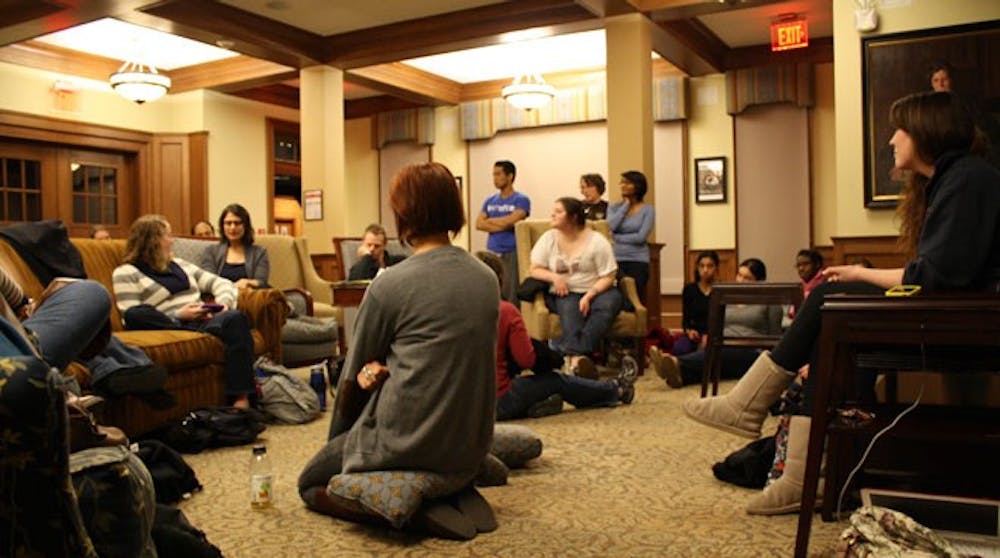A montage of media clips flickers into focus in front of my armchair, and a matter-of-fact voice says: "There is a moral panic in America over young women's sexuality."
The voice belongs to feminist author Jessica Valenti, and the clips flash from her 2011 documentary called "The Purity Myth: How America's Obsession with Virginity is Hurting Young Women." My armchair is planted in the Westhampton Living Room, where I'm one of the few attendees outside of students from the Women in Living and Learning program who are hosting the screening. I sink into the cushion and wait for more.
According to Valenti's social and political research, the U.S. is home to a resurgence of premarital purity pledges from daughter to father, political advocacy for abstinence and the biased view that contraceptives reward irresponsible women. Valenti said these sentiments stemmed from public figures who believed the country was dissolving in a "haze of promiscuity and moral decay."
The result is the purity myth, Valenti said, or the lie that sexuality determines who we are. That myth is rooted in inequality. "Women are led to believe our moral compass lies somewhere between our legs," Valenti said.
The other students and I sit and watch this documentary in the wake of the Komen Foundation's political snafu. A Feb. 1 statement from Susan G. Komen for the Cure asserted that the foundation's decision to pull funding for Planned Parenthood was not rooted in politics, but in the desire to "free up dollars for direct services for vulnerable women. To support this new granting strategy, Komen has also implemented more stringent eligibility standards to safeguard donor dollars. Consequently, some organizations are no longer eligible to receive Komen grants."
But Komen's mission to fight breast cancer, "to save lives, empower people, ensure quality care for all and energize science to find the cures," is not contradicted by the pursuits of Planned Parenthood.
Planned Parenthood is an organization with global influence that has provided and advocated for reproductive health care, rights and education for 95 years. According to its mission statement: "Planned Parenthood believes in the fundamental right of each individual, throughout the world, to manage his or her fertility, regardless of the individual's income, marital status, race, ethnicity, sexual orientation, age, national origin, or residence.
"We believe that reproductive self-determination must be voluntary and preserve the individual's right to privacy."
Although Planned Parenthood does provide abortion services, they account for only 3 percent of its total health services. Most of the staff's attention is given to administering Pap tests, breast exams, STD tests and treatments and sex education, according to the organization's statistics.
After being slapped with widespread outrage, Komen expressed regrets that Planned Parenthood was negatively affected by the grant withdrawal and restored the funds for existing grants, including those for Planned Parenthood. In a Feb. 3 statement, Komen CEO Nancy Brinker said: "Our only goal for our granting process is to support women and families in the fight against breast cancer. Amending our criteria will ensure that politics has no place in our grant process."
But politics did have a place. Komen vice president Karen Handel, known for her conservative politics and anti-choice leanings, resigned from her position after Planned Parenthood regained funding.
It is difficult to disentangle Handel's sentiments from the purity myth. Her actions and ideology suggest an inclination to "purify" breast cancer research and support by removing its ties to sexually progressive groups like Planned Parenthood.
Enjoy what you're reading?
Signup for our newsletter
The irony? Breast cancer research itself is sexually progressive. It is an effort to scientifically defy gene mutation in breasts. And breasts are definitive characteristics of the female sex.
Komen supports the right of women to choose what to do with their bodies when they have cancer, whether that means undergoing surgery or radiation, or letting the illness take its course. An organization like Planned Parenthood deserves the same support, not just because it administers breast exams, but because it promotes the self-determination of women in receiving healthcare for their bodies.
Most of us at the University of Richmond were born with a sense of self-determination. Generally, our parents have provided us with the financial stability and emotional support we need to determine what we want to do while we are in college and after, and then to do it.
I look around campus and see that the cup runneth over with driven, dreaming and confident students. We are confident because, for the most part, we know we can choose to be the way we are. We have grown accustomed to the independence that college brings - we choose what to do with our friends, with our days and with our talents. What if we were unable to choose what to do with our bodies?
Support independent student media
You can make a tax-deductible donation by clicking the button below, which takes you to our secure PayPal account. The page is set up to receive contributions in whatever amount you designate. We look forward to using the money we raise to further our mission of providing honest and accurate information to students, faculty, staff, alumni and others in the general public.
Donate Now


